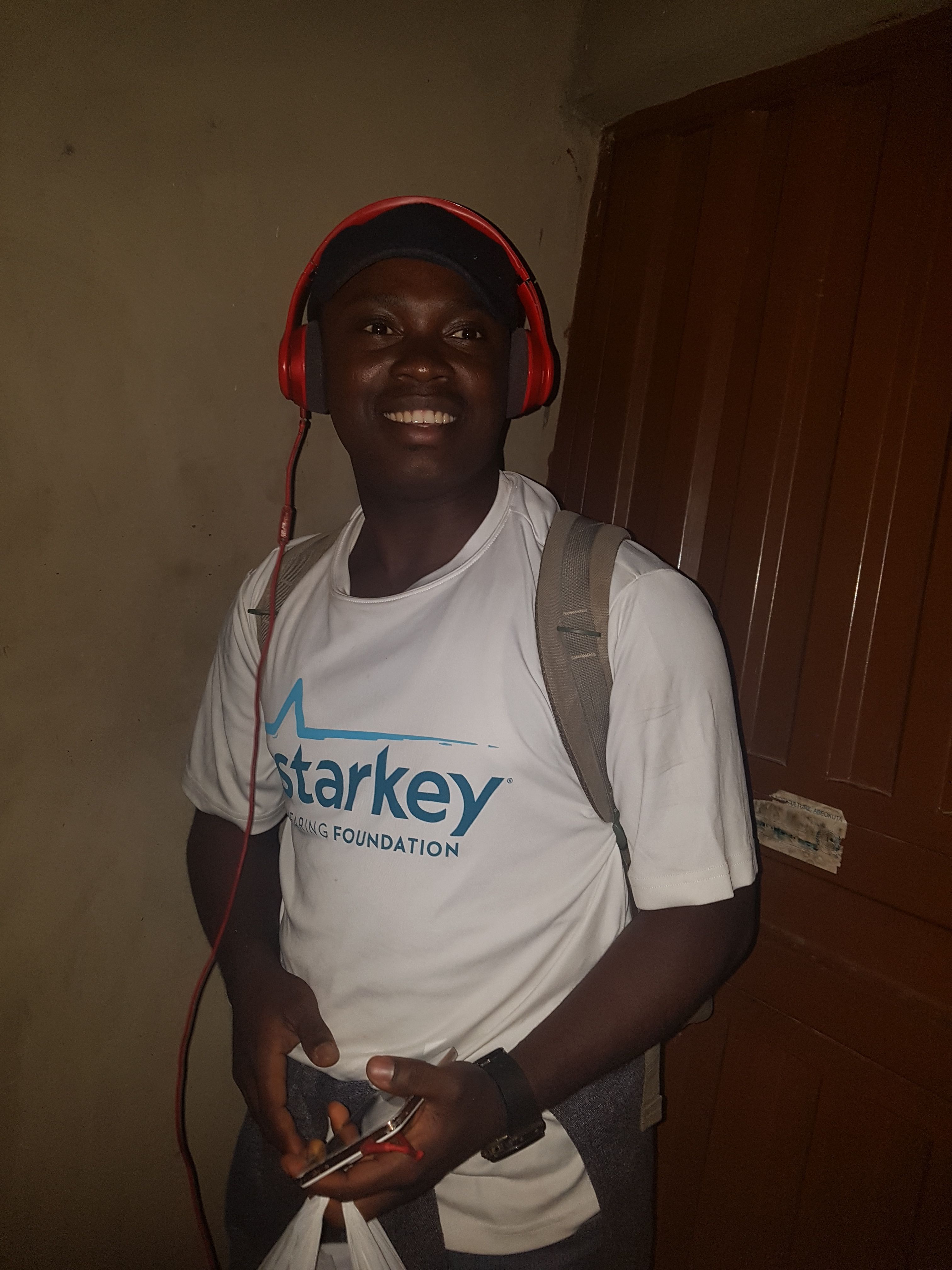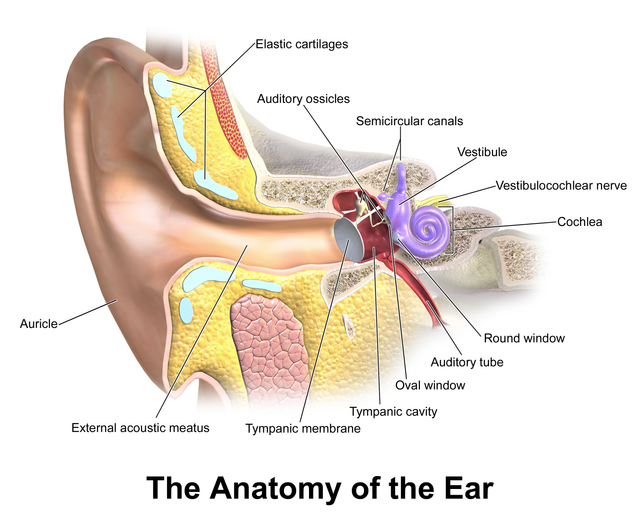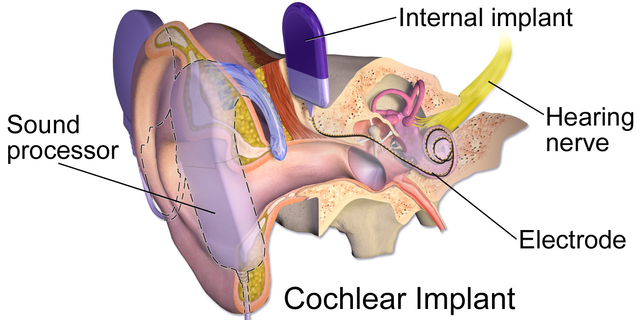
wikimedia commons
Before June 2017, little or nothing is what I’ve heard or known about that seemingly big word - MENINGITIS. Well, it happened that I was invited to work as a volunteer on a project and the purpose of the project made it easy to make up my mind. I was told that a hearing foundation was preparing to come to Nigeria with the aim of helping people who suffer from various level of hearing losses, and I became excited and began to look forward to it, why?
Because I love to help people especially those who are less priviledged, I started learning sign language early in my life, say when I was 11 years of age, a language of the deaf and hearing impaired ones, which came with learning their cultures and behaviours and understanding why they do what they do and how to deal with them. So I saw opportunity to relate more with the deaf ones and experience firsthand the joy of giving. The outreach was organized by Starkey Hearing Foundation and Olusegun Obasanjo Foundation to distribute over N2million worth hearing-aids to Nigerians across different geo-political zones.
Starkey is a hearing foundation based in the US and has branches across the world, with the sole mission of helping people regain their hearing ability, which is so evident in their motor.
Starkey Hearing Foundation - So the world may hear
Olusegun Obasanjo Foundation, OOF was founded by Chief Olusegun Obasanjo (GCFR), a two-term former president of Nigeria, in an effort to give back to the community, and hearing-aid outreach is big part of that mission to help Nigerians.
A 10-day program was organized across the nation and stations were set up in Abeokuta, Lagos, Kwara, Umuahia, and Kaduna. And I was priviledged to join in the Abeokuta and Lagos Outreach. Patients were registered to collect information for database record, then various tests were carried out to determine the nature and degree of hearing loss, where necessary, hearing aids were given and recipients were educated on how to use and care for their hearing aids. During those days, I worked in registering patients and the cause of their hearing-impairment. I however noticed that meningitis occurred more as a cause of hearing loss.Olusegun Obasanjo Foundation - Living life to the fullest...
Well, as for my experience in charitable work and the many funny stories of people who were fine but only heard that there would be free hearing aids and came, let’s leave it for another time, and focus on what caught my attention. I thought to myself, what is this meningitis that has left so many people deaf? Can it be avoided? Can it be cured? What must I know about this meningitis?
What is Meningitis?
According to webmd, Meningitis is a rare infection that affects the meninges – very delicate membrane that covers the brain and spinal cord. This inflammation or swelling can make the symptoms recognizable, symptoms which include headache, fever and stiff neck. There are about 3 main types of such infection, namely, fungal, viral, and bacterial meningitis. It can be contacted through close contact and could be life threatening.
Viral meningitis seem to be the least severe type as the body can heal itself and get back to normal without medication, while the fungal type is about the rarest form of this disease as it only attacks people with low immune defense. Bacterial Meningitis on the other hand is the commonest form of meningitis and can infect anyone across the age groups. It has also proven to be the deadliest form of the disease. Let’s see how.
Bacterial Meningitis
This is the most dreaded form of meningitis and it is caused by bacteria infection through other parts of the body like the ear and can cause death in as early as hours after infection, or leave the patient with serious damage to the brain, loss of hearing and learning disabilities. A study shows that in the United States alone, between 2003 and 2007, over 4000 cases of bacterial meningitis was recorded with over 500 recorded cases of deaths. There are common bacteria that causes this common form of meningitis. They are:
- Streptococcus pneumonia
- Group B Streptococcus
- Neisseria Meningitidis
- Haemophilus influenza
- Listeria monocytogenes
The disease can affect anyone regardless of your age, but certain age groups are more susceptible to infections, and research has shown that infants and elderly people have been most affected. The causes are classified below by age group.
| Age Group | Bacteria Causing Meningitis |
|---|---|
| Infants | Group B Streptococcus, Streptococcus pneumonia, Listeria monocytogenes |
| Babies and Children | Streptococcus pneumonia, Neisseria meningitides, Haemophilus influenza type b (Hib), group B Streptococcus |
| Teens and young adults | Neisseria meningitides, Streptococcus pneumonia |
| Older Adults | Streptococcus pneumoniae, Neisseria meningitidis, Haemophilus influenza type b (Hib), group B Streptococcus, Listeria monocytogenes |
The good news is that it can be cured if diagnosed on time, by administering strong antibiotics. These antibiotics are ototoxic, and can also lead to deafness. But how do you know if someone has this form of Meningitis? Especially for infants.
Symptoms of Bacterial Meningitis
The common symptoms of this disease include:
- High fever
- Vomiting
- Rashes
- Headache
- Stiffness of the neck (painful)
- Sensitivity to light
- Irritability
- Drowsiness
For very little children, detecting all the above symptoms might not be possible since they cannot verbally express how they feel. However, certain symptoms should be watched out for. These include:
- Refusal of food
- Baby appearing unusually pale or blotch
- Vomiting
- Baby having red prick-looking rash
- Arching back and retracting neck
- High pitch crying
- Continued fussiness when held
- High fever with cold hands and feet
Among the many consequences of bacterial meningitis, loss of hearing is particularly of interest to me as over 20 million Nigerians suffer from one kind of hearing loss or another.
Bacterial Meningitis – A major cause of deafness
The rather famous Author and political activist, Helen Keller was blinded and deafened at an early stage of her life by this dreaded disease, meningitis. That was before modern medicine discovered how deadly the disease is. Over the years a lot of effort has been expended in battling this menace.
M P Richardson researched into hearing loss during bacterial meningitis, a total of 124 children who were newly diagnosed with bacterial meningitis and observed that about 74% had meningococcal and 15% had pneumococcal meningitis, with all of them showing apparent hearing loss at first assessment. About 2.4% had permanent sensorineural hearing loss, while 10.5 % had reversible hearing loss and were resolved within 48 hours of treatment.
The research demonstrated how powerful and deadly the disease can be. But how does meningitis cause hearing loss?
Mechanism of Bacterial Meningitis-Related deafness
A brief understanding of how our ear works can help us to easily understand how this infection causes deafness. Sound waves that contains information or message to be transmitted are caught by the outer ear and passes to the middle ear which consist majorly of the eardrum which is made to vibrate in response to the amplitude and frequency of the wave. The vibration is then passed to the inner ear through the oval window. In the inner ear is where you find the labyrinth which consist majorly of vestibular and the cochlea. In the cochlea is where the major magic takes place, where the sound wave is converted to electrical signals or impulses and then sent to the brain.
Bacterial meningitis causes an inflammation of the inner ear which could destroy some parts of the cochlea. When this occur, the cochlea becomes insensitive to sound wave and does not convert it to electrical impulse. Hence, you cannot hear. Sound wave gets into the ear but doesn’t reach the brain. Meningitis can cause ear inflammation in as early as 2 days after infection, and importantly, if infection is not treated immediately, the cochlea can become ossified within a few weeks.
To ossify means the soft tissue of the cochlea is turned to bone.
We would obviously want to know if it is communicable, how it can be contacted, if it can be prevented, and how it can be prevented.
How it Spreads
The infection is caused by exposure to germs carrying the bacteria, and it can spread from one person to another, while certain germs can spread through food, like Listeria monocytogenes. The manner at which the germ is transferred will also depend on the type of bacteria. Some people are regarded at carriers, because they can have the bacteria on their bodies and still not get sick, but have the capacity to transmit to others. You will want to steer clear of these ones, wouldn’t you?
Group B streptococcus and Escherichia coli which are common in babies are often passed on to them from their mothers during labour and birth.
Hib and Streptococcus pneumonia can be spread by coughing or sneezing. I guess that’s more reason to steer clear of someone coughing next to you.
Neisseria meningitides can be transmitted by sharing respiratory secretion or saliva. The next time you wanna kiss any random person, you’ve gotta think it twice, won’t you? Living in the same household kind of contact too can make you more susceptible. I guess that might not be entirely avoidable.
Escherichia coli can be contracted by eating contaminated food, usually prepared by someone who went to toilet and did not wash their hands. Another reason why random eating especially at restaurant you are not sure of.
Important Note to Pregnant Women
Pregnant women are at higher risk of having listeriosis , a food poisoning that results from ingesting food contaminated with listeria monocytogenes bacterium, which can result in miscarriage, premature delivery, still birth or serious infection to newborn, such as meningitis. Pregnant women must be cautious of foods taken while pregnant and avoid eating out.
It is important to get tested at about 35 to 37 weeks of pregnancy, especially for group B streptococcus, which is more likely to transmit to their babies at birth. Antibiotics are administered to pregnant patients at birth if they already tested positive to the bacterium.
Prevention
Vaccines are quite effective in battling this disease as most of the bacterial meningitis causes can be prevented. However, certain strains of bacterial meningitis are not preventable by vaccination. The E coli meningitis and the group B streptococcal meningitis are the two strains which remain unpreventable by vaccine. Being vaccinated too does not guarantee non-infection so other care must be taken.
It is important to always wash your hands, especially before eating. Ensure that your hands are properly washed with soap. Be very careful who you share your intimacy with. Do not eat food from unverified sources. Pregnant women need to get tested before child birth.
But suppose someone is diagnosed with this disease, what can such one do?
Care for Bacterial Meningitis
When a doctor suspects that you may have meningitis, samples of your blood or spinal fluid will be taken for test, and specific tests will be carried out to determine which bacterium or bacteria caused the meningitis so as to know what antibiotics to administer. Treatments are to commence immediately as any delay could be fatal to the patient’s health and well-being.
Treatment for Hearing Loss
It must be noted that not everyone diagnosed with Bacterial meningitis will develop hearing loss. It is however important to perform different hearing test as soon as it can be possible after diagnosis. Patient can begin to experience hearing loss as early as 2 days after infection. And after a few weeks such patient can become totally deaf.
Quick treatment of meningitis can prevent incidence of hearing loss and also reverse a degree of hearing loss.
Hearing losses are of varying types and degree, so different test should be carried out to ensure that the patient does not suffer from future hearing loss. Mindy Schmelzer, AuD, an audiologist, noted that even when children passed a hearing test, they should still get tested in another three month time and another for the first year, to ensure that hearing loss do not occur months after meningitis treatment.
In cases where hearing loss occurred, hearing aids can be used to enhance hearing. So many people got a better shot at hearing after receiving the free hearing aids given out by Starkey and Olusegun Obasanjo Foundation last year. I was priviledged to see for myself the joy in people when they realize they can hear again.
Cases of cochlea damage may not be remedied by hearing aids and might require a cochlea implant. The process of an implant which happens to be another interesting feat in the field of medicine will be discussed in another article. Helen keller mentioned earlier, for example, would have had a shot at hearing again if there were medical technologies that made cochlea transplant possible. Post Treatment Care
After treatment, patient need to eat good food and have proper rest as headache might be a constant after effect of the treatment. Avoid smoking, and limit close contact with sick people because of the immune system.
There may be need to administer antibiotics to close relatives who may be at risk of contracting the disease. Doctors call it prophylaxis, and is often recommended. So if you happen to have a close friend or relative who has been treated, make sure you also use antibiotics to prevent being infected too.
Conclusion
I was fulfilled to have participated in that exercise, it taught me a lot. I am more grateful about the seemingly little things. Children who experience hearing losses in whatever form or degree are less likely to excel in school. They are often at a disadvantage when it comes to learning and human relation, we need to help them.
African parents whose children suffer from meningitis and suffer from hearing loss do not pay enough attention and often attribute hearing loss to certain fetish reason and would rather take the child to a church or spiritual herbalist than to the hospital or specialists. Often times, reversible hearing loss eventually result in deafness, because proper care was not take and priorities were misplaced.
What is your disposition when you see someone deaf? Do you try to render help wherever needed or do you just neglect them? Helping someone in need brings joy and happiness

The joy and fulfillment after the charity work
Material References
Meningitis
Bacterial Meningitis
Hearing loss and care
Hearing loss
Meningitis is a major cause of hearing loss in children
Meningitis and Hearing Loss: What to Do
Meningitis and Hearing Loss in Children
Meningitis & Hearing Loss
Cause of Hearing Loss: Meningitis
Hearing loss during bacterial meningitis
If you write STEM (Science, Technology, Engineering, and Mathematics) related posts, consider joining #steemSTEM on steemit chat or discord here. If you are from Nigeria, you may want to include the #stemng tag in your post. You can visit this blog by @stemng for more details.







Our president suffered from this last year or there about. He had to be treated in London just for this disease. I hope our medical infrastructure is developed as soon as it can... Nice write up by the way.. And keep steeming!
Downvoting a post can decrease pending rewards and make it less visible. Common reasons:
Submit
Are you sure it was a case of meningitis?
Downvoting a post can decrease pending rewards and make it less visible. Common reasons:
Submit
He was almost deafen... Maybe i just concluded lol 😂😂
Downvoting a post can decrease pending rewards and make it less visible. Common reasons:
Submit
I've heard about meningitis several times, but not enough to be able to explain it even to a little child. Thanks to you, I know much more now. I'm also very familiar with deaf people as I began learning American Sign Language since I was 12 also, and that has greatly helped my relationship with deaf people, I have a good number of them as friends, and they certainly remind me to be grateful.
Downvoting a post can decrease pending rewards and make it less visible. Common reasons:
Submit
Dear friend, you do not appear to be following @wafrica. Follow @wafrica to get a valuable upvote on your quality post!
Downvoting a post can decrease pending rewards and make it less visible. Common reasons:
Submit
Dear friend, you do not appear to be following @wafrica. Follow @wafrica to get a valuable upvote on your quality post!
Downvoting a post can decrease pending rewards and make it less visible. Common reasons:
Submit
This is quite some effort. Never read anything on meningitis till now. Though It seems your work is plaqued by few plagiarised lines. You might want to fix that and refer back to me on discord
Downvoting a post can decrease pending rewards and make it less visible. Common reasons:
Submit
Thanks for the observation.
Done already
Downvoting a post can decrease pending rewards and make it less visible. Common reasons:
Submit
Congratulations @real2josh! You have completed some achievement on Steemit and have been rewarded with new badge(s) :
Click on any badge to view your own Board of Honor on SteemitBoard.
To support your work, I also upvoted your post!
For more information about SteemitBoard, click here
If you no longer want to receive notifications, reply to this comment with the word
STOPDo not miss the last announcement from @steemitboard!
Downvoting a post can decrease pending rewards and make it less visible. Common reasons:
Submit
Interesting article here, consider the use of shorter paragraphs as it is easier to read. Thank you for sharing.
Downvoting a post can decrease pending rewards and make it less visible. Common reasons:
Submit
Feedback taken. Thanks
Downvoting a post can decrease pending rewards and make it less visible. Common reasons:
Submit
Being A SteemStem Member
Downvoting a post can decrease pending rewards and make it less visible. Common reasons:
Submit
Downvoting a post can decrease pending rewards and make it less visible. Common reasons:
Submit